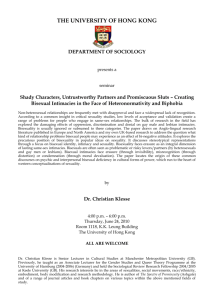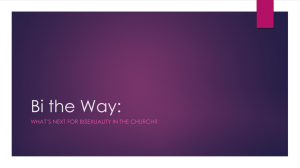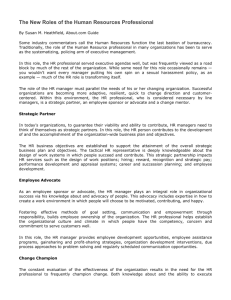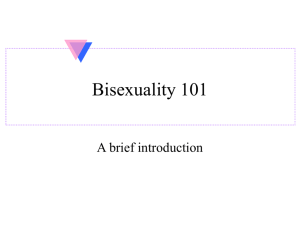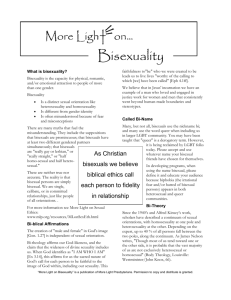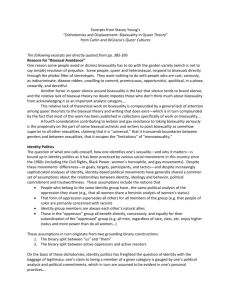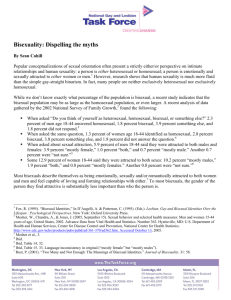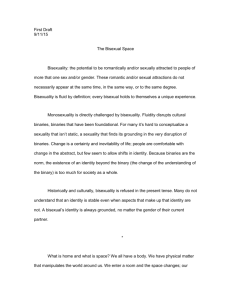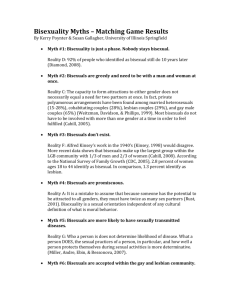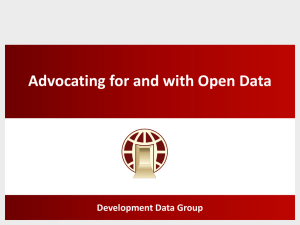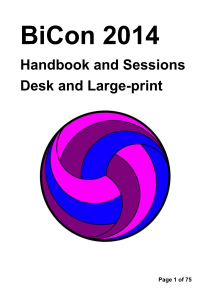the MCC Be a Bisexual Advocate Brochure here
advertisement
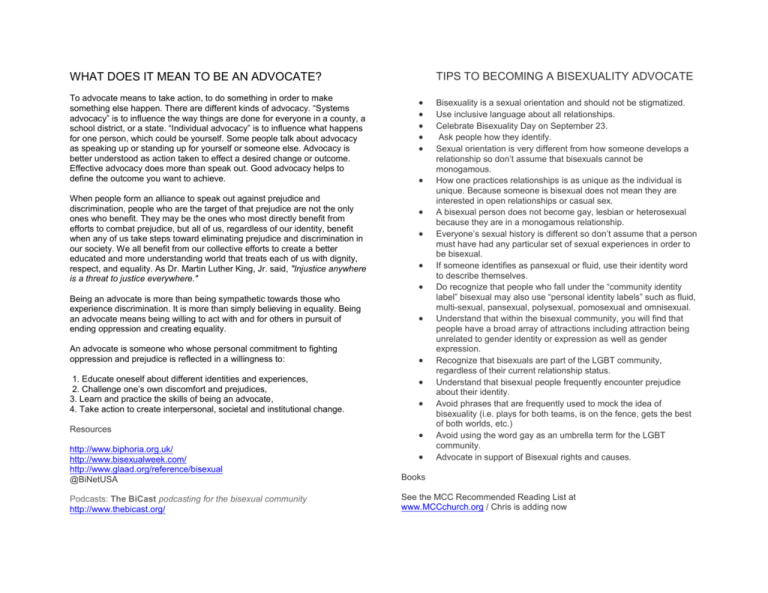
TIPS TO BECOMING A BISEXUALITY ADVOCATE WHAT DOES IT MEAN TO BE AN ADVOCATE? To advocate means to take action, to do something in order to make something else happen. There are different kinds of advocacy. “Systems advocacy” is to influence the way things are done for everyone in a county, a school district, or a state. “Individual advocacy” is to influence what happens for one person, which could be yourself. Some people talk about advocacy as speaking up or standing up for yourself or someone else. Advocacy is better understood as action taken to effect a desired change or outcome. Effective advocacy does more than speak out. Good advocacy helps to define the outcome you want to achieve. When people form an alliance to speak out against prejudice and discrimination, people who are the target of that prejudice are not the only ones who benefit. They may be the ones who most directly benefit from efforts to combat prejudice, but all of us, regardless of our identity, benefit when any of us take steps toward eliminating prejudice and discrimination in our society. We all benefit from our collective efforts to create a better educated and more understanding world that treats each of us with dignity, respect, and equality. As Dr. Martin Luther King, Jr. said, "Injustice anywhere is a threat to justice everywhere." Being an advocate is more than being sympathetic towards those who experience discrimination. It is more than simply believing in equality. Being an advocate means being willing to act with and for others in pursuit of ending oppression and creating equality. An advocate is someone who whose personal commitment to fighting oppression and prejudice is reflected in a willingness to: Bisexuality is a sexual orientation and should not be stigmatized. Use inclusive language about all relationships. Celebrate Bisexuality Day on September 23. Ask people how they identify. Sexual orientation is very different from how someone develops a relationship so don’t assume that bisexuals cannot be monogamous. How one practices relationships is as unique as the individual is unique. Because someone is bisexual does not mean they are interested in open relationships or casual sex. A bisexual person does not become gay, lesbian or heterosexual because they are in a monogamous relationship. Everyone’s sexual history is different so don’t assume that a person must have had any particular set of sexual experiences in order to be bisexual. If someone identifies as pansexual or fluid, use their identity word to describe themselves. Do recognize that people who fall under the “community identity label” bisexual may also use “personal identity labels” such as fluid, multi-sexual, pansexual, polysexual, pomosexual and omnisexual. Understand that within the bisexual community, you will find that people have a broad array of attractions including attraction being unrelated to gender identity or expression as well as gender expression. Recognize that bisexuals are part of the LGBT community, regardless of their current relationship status. Understand that bisexual people frequently encounter prejudice about their identity. Avoid phrases that are frequently used to mock the idea of bisexuality (i.e. plays for both teams, is on the fence, gets the best of both worlds, etc.) Avoid using the word gay as an umbrella term for the LGBT community. Advocate in support of Bisexual rights and causes. 1. Educate oneself about different identities and experiences, 2. Challenge one’s own discomfort and prejudices, 3. Learn and practice the skills of being an advocate, 4. Take action to create interpersonal, societal and institutional change. Resources http://www.biphoria.org.uk/ http://www.bisexualweek.com/ http://www.glaad.org/reference/bisexual @BiNetUSA Books Podcasts: The BiCast podcasting for the bisexual community http://www.thebicast.org/ See the MCC Recommended Reading List at www.MCCchurch.org / Chris is adding now THINGS TO REMEMBER AS AN ADVOCATE Members of Groups that Face Oppression: • don’t always want to be “teachers” • don’t represent all members of a particular group • are often members of more than one group that faces oppression • may not describe themselves the same way as other members of a particular group • know what it feels like to be both targeted and made “invisible” • may not be experts on their own cultures and oppressions • can be prejudiced themselves, even towards members of their own oppressed group(s) • may be more sexist, racist, heterosexist, etc. than members of other groups • may tire of answering questions about their cultures and lives • tire of and resent stereotyping because they generally perpetuate an oppressive ideology • can become weary, anxious, irritable, or angry because of living in the dominant culture that is not accepting of their own • do not necessarily want to become more like the dominant culture in attitudes or behavior • may share some of the same values as the dominant culture • do not appreciate appropriation of their cultures by non-members because non-members do not share the same life experiences • have been a part of history, art, science, religion, education, etc., but their contributions have often been ignored, downplayed, or wrongfully taken credit for • may use typically derogatory terms for themselves and other members of their group, but may prefer that non-members do not use these words Become A Bisexuality Advocate! Celebrate Bisexuality Day 23 September 23 2015 Bisexual Awareness Week 20 – 26 September 2015 Videos Things Bisexual People Are Tired of Hearing (https://www.youtube.com/watch?v=k6SXrK0l-ZA) Ask a BI Guy (https://www.youtube.com/watch?v=BYCMvYK0GxU&feature=youtu.be) Bisexuality Awareness Day was created in 1999 by three bisexual activists who were seeking stronger visibility for the B contingent of LGBT.
